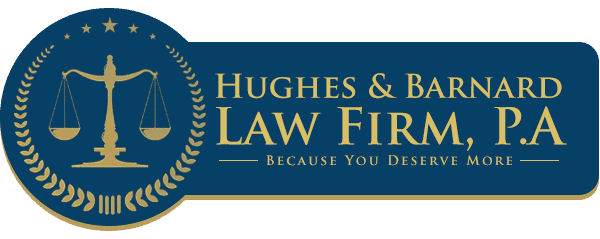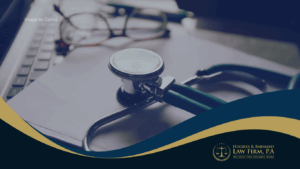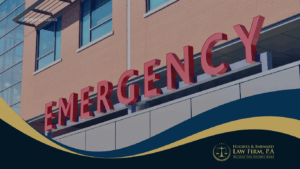
What Is Expressed Consent in Healthcare?
Written by the Hughes and Barnard Law Firm, PA marketing team and reviewed by Attorney Howard Hughes to ensure quality and accuracy.
What Is Expressed Consent in Healthcare?
Expressed consent in healthcare is a critical legal and ethical principle that ensures patients have the right to make informed decisions about their medical care. It refers to a patient’s explicit agreement to a medical procedure, given either verbally or in writing, after receiving detailed information about the treatment, potential risks, benefits, and alternative options.
Unlike implied consent, which is inferred from a patient’s actions (such as rolling up a sleeve for a vaccination), expressed consent requires a clear and affirmative agreement. This type of consent is particularly important for procedures that carry significant risks or long-term consequences.
Key Takeaways
- Expressed consent in healthcare refers to a patient’s clear and direct agreement to a medical procedure, given verbally or in writing.
- It differs from implied consent, which is inferred from a patient's actions rather than explicitly stated.
- Expressed consent is crucial for patient autonomy, ensuring individuals are fully informed before undergoing medical treatments.
- It is legally required for surgeries, high-risk treatments, clinical trials, and other significant medical procedures.
- Failure to obtain proper expressed consent may lead to medical malpractice claims, including negligence or battery lawsuits.
- Patients who believe they underwent a procedure without full informed consent may have legal options to seek compensation.
Why Is Expressed Consent Important?
Expressed consent serves as a safeguard for both patients and healthcare providers. Its primary purposes include:
Protecting Patient Rights
Every individual has the right to control what happens to their body. Expressed consent ensures that patients are fully informed and have the autonomy to accept or refuse treatment.
Ensuring Informed Decision-Making
Medical procedures can have serious implications. Providing clear, understandable information allows patients to weigh their options carefully before giving consent.
Reducing Legal Liability for Healthcare Providers
If a provider performs a procedure without proper consent, it can lead to allegations of medical negligence or malpractice. Having documented proof of expressed consent can help prevent legal disputes.
Promoting Ethical Medical Practices
Informed consent fosters trust between patients and healthcare providers, ensuring that medical professionals respect patient autonomy and adhere to ethical guidelines.
When Is Expressed Consent Required?
Expressed consent is necessary in many medical situations, including but not limited to:
- Surgical Procedures: Before undergoing any surgery, patients must sign a consent form acknowledging they understand the procedure, risks, and possible complications.
- Medical Treatments with Significant Risks: Procedures such as chemotherapy, radiation therapy, or organ transplants require expressed consent due to their serious side effects.
- Clinical Trials and Experimental Treatments: Patients participating in medical research or experimental treatments must provide expressed consent after reviewing detailed information about potential risks and benefits.
- Invasive Diagnostic Procedures: Tests such as biopsies, spinal taps, or colonoscopies often require explicit patient approval due to their invasive nature.
- Mental Health Treatments: In some cases, treatments like electroconvulsive therapy (ECT) require expressed consent from the patient or a legal representative.
The Legal Implications of Expressed Consent
Failure to obtain proper expressed consent can have serious legal consequences. If a healthcare provider administers treatment without it, the patient may have grounds for a medical malpractice claim. Key legal aspects include:

Lack of Consent Can Be Considered Battery
If a medical procedure is performed without proper consent, it may be considered an unauthorized touching, which can be classified as medical battery.
Failure to Provide Sufficient Information May Lead to Negligence Claims
Even if a patient consents to a procedure, they must be given all relevant information. If a provider withholds crucial details about risks, the patient may argue that their consent was not truly "informed."
Exceptions to Expressed Consent
In emergencies, when a patient is unconscious or unable to give consent, healthcare providers may proceed with necessary treatment under the legal doctrine of implied consent. However, in non-emergency situations, failure to obtain proper consent can be grounds for legal action.
How to Prove a Lack of Expressed Consent in a Medical Malpractice Case
If a patient believes they underwent a procedure without their full, informed consent, they may have legal options. To prove a lack of expressed consent in a medical malpractice case, the following factors are often considered:
1. Was the patient fully informed?
Did the healthcare provider explain all risks, benefits, and alternatives?
2. Did the patient give clear, voluntary consent?
Consent must be given freely without coercion.
3. Is there a signed consent form?
A written document is the strongest form of evidence in disputes over consent.
4. Did the provider deviate from what was consented to?
If a different procedure was performed without the patient’s approval, this may constitute medical malpractice.
At Hughes and Barnard Law Firm, PA, we help patients understand their legal rights when healthcare providers fail to follow proper consent procedures. If you believe you underwent a procedure without full and informed consent, we can evaluate your case and guide you on the next steps.
Contact Hughes and Barnard Law Firm, PA for Legal Help
Understanding your rights regarding expressed consent in healthcare is crucial. If you or a loved one received medical treatment without proper consent, you may have grounds for legal action. At Hughes and Barnard Law Firm, PA, our experienced attorneys are committed to protecting patient rights and holding negligent medical professionals accountable.
Contact us today for a free consultation to discuss your case and explore your legal options.



